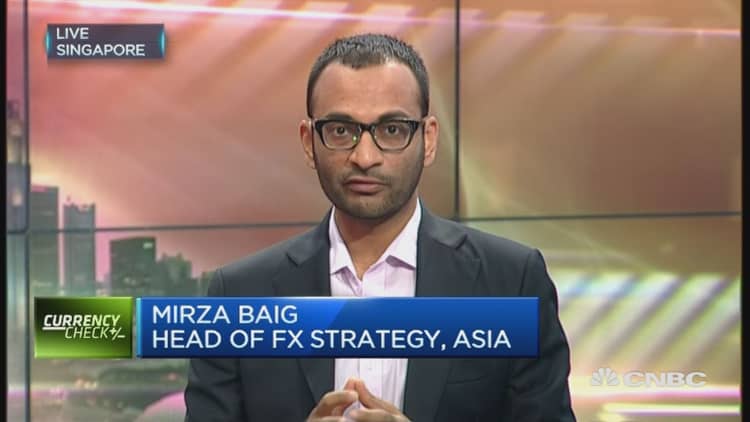


The yen's steep climb this month has spurred a startle response among Japan's policymakers who face a fish stew of forces pushing the currency higher.
The yen's move has certainly been steep: The dollar was fetching as little as 103.64 yen on Thursday, down from more than 111 yen in late May.
The surge spurred Japan Finance Minister Taro Aso to jawbone the currency on Friday, saying he was deeply concerned by the "one-sided, rapid and speculative moves," according to a Reuters report. "We will respond more than ever when necessary," Aso said, according to Reuters.
That echoed comments early Thursday by the government's chief spokesperson, who prior to the policy announcement from the Bank of Japan (BOJ) around mid-day said that the yen's moves were being closely watched, calling the appreciation rapid and speculative, according to a Reuters report.
Indeed, in the press conference following the BOJ announcement, BOJ Governor Haruhiko Kuroda broke with his usual practice of refraining from commenting on the exchange rate and instead said he was closely watching the yen's movements.
Aso on Friday said that officials from the Ministry of Finance, the BOJ and the Financial Services Agency held a regular meeting Friday discuss financial markets, Reuters reported. Top currency official Masatsugu Asakawa said the officials agreed in the meeting that the yen's volatility was increasing and that they would remain in close contact, Reuters reported.
But it isn't clear whether the brainstorming session can produce any concrete results.
For one, intervention might not be an option.
Mirza Baig, head of foreign exchange at BNP Paribas, told CNBC's "Rundown" that outright intervention would be difficult in the current environment. Not only would it be against G-20 principles of avoiding unilateral interference in the market, but also on other occasions when the BOJ has acted without other central banks, the efforts hadn't met with longer-term success.
Much of the recent upward pressure on the yen also hasn't been related to domestic factors and that would likely stymie any efforts to intervene.
In particular, concerns that the U.K. will vote to exit the European Union in its referendum on June 23, a potential event dubbed Brexit, has been driving risk aversion in the markets and that's driven flows into the yen because of its status as a safe-haven.

The Brexit fears have pushed the . The common currency was fetching as little as 115.60 yen on Thursday, down from levels over 124 yen at the end of May.
The concerns may yet drive more yen strength, analysts said.
"Next week, if the U.K. decides to exit, the dollar-yen could fall quite easily below a 100. Something like 95 would be possible," Shusuke Yamada, a foreign-exchange strategist at Bank of America-Merrill Lynch, told CNBC's "Squawk Box."
He noted that the yen often worked as a funding currency and market jitters can quickly push funds back into the currency.
"Japanese investors [have] bought massive amounts of foreign securities over the past few years and at the time just like it is now, the repatriation is going to be very heavy," Yamada said.
Analysts expect the fund flows could accelerate if the U.K. vote went to the Brexit camp. In a note Thursday, Goldman Sachs estimated the yen could appreciate about 14 percent against a basket of major developed market currencies.
Another factor pushing up the yen: The Federal Reserve on Wednesday stood pat on interest rates. The markets have been looking to higher U.S. interest rates would help to push funds out of Japan and into higher yielding assets.
Markets may also have lost confidence in the BOJ's own policy measures.
On Thursday, the BOJ kept its policy largely steady, as was widely expected, but the yen still surged.
"The skepticism about the BOJ's policy effectiveness has increased ever since the start of this year when the controversial negative rate policy was introduced," DBS said in a note Friday. "Investors are questioning whether the 2 percent inflation target is achievable, whether negative rates will do more benefits than harms to the economy, and whether the rapid pace of asset purchases under the [qualitative quantitative easing] program is sustainable."
Others were more blunt about Governor Kuroda's polices: "Kurodanomics has failed," Japan Macro Advisors said in a note Friday. JMA said the BOJ has nearly exhausted its policy tools and further monetary easing would likely harm the economy, not help, absent an "emergency" situation.
But there was some expectation that the yen could reverse course.
On Friday morning Asia time, the yen was off its highs against both the euro and the dollar. The dollar was fetching 104.59 yen and the euro was at 117.66 yen at 10:01 a.m. SIN/HK.
That may be on perceptions that the chances of the U.K. referendum leading to a Brexit may be receding.
Campaigning for the referendum was halted Thursday, after a British lawmaker, Jo Cox, a pro-EU campaigner, was shot to death while meeting with constituents. Police said they arrested a 52-year-old man in the attack on Cox, but did not know of a motive for the killing.
Some media reports cited witnesses who said the attacker yelled "Britain first," repeatedly, although others contradicted that statement and it hasn't been confirmed. Britain First, an anti-immigration right wing group which backs Brexit, distanced itself from the attack.
But some analysts said the attack may change the tide of public opinion.
"Certainly people are talking about the possibility that this [Cox's murder] does influence the Brexit vote in favor of Remain. It is a tragic event all around. There is a sense; there is an immediate emotional reaction….It definitely is seen as part of the story, the recovery of risk," said Alan Ruskin, global co-head of FX research at Deutsche Bank.
Follow CNBC International on Twitter and Facebook.
—By CNBC.Com's Leslie Shaffer; Follow her on Twitter @LeslieShaffer1


